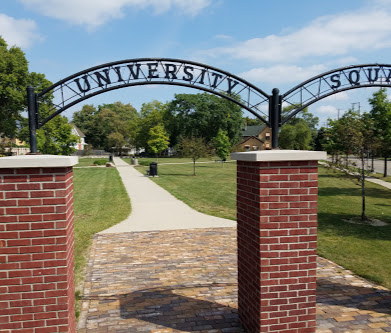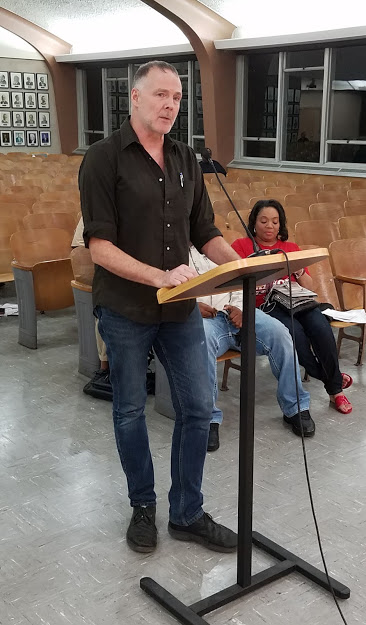By Luther Houle
Well past sunset, the second monthly City Council meeting for September came to order at 8:15 p.m. Monday Sept. 23 after a three-hour Special Affairs Committee meeting.
The Special Affairs Committee meeting is where the City Council decides which issues will be addressed during the subsequent council meeting. With tensions high and a thicker-than-average agenda to sort through, council members were challenged to call their meeting to order nearly three hours after its scheduled commencement time.
Highlights from Monday’s City Council meeting include continued backlash to the proposed affordable income housing proposed for Carriage Town, a $7 million payment for service line replacement, a $75,000 transfer from the city’s general fund to pay for doubled janitorial prices, an increase to the Flint Lead Exposure Registry grant, and the first reading of an “opt-out” article to prohibit the sale of recreational marijuana within city limits.

How the corner of Grand Traverse and University avenues looks today (Photo by Tom Travis)
Carriage Town plan protested, developer defended
As introduced at the Sept. 9 City Council meeting, Communities First, Inc. is pursuing plans to build an affordable housing project in Carriage Town at the corner of Grand Traverse and University avenues on property owned by Flint businessman Troy Farah. Some residents took the opportunity to let Council know they do not support the development.

Ken Van Wagoner addressing the Flint City Council (Photo by Tom Travis)
Ken Van Wagoner, a resident of Carriage Town and the owner of Good Beans Cafe, stepped forward to the podium, saying “I don’t trust Communities First.” Speaking about the proposed project, he said “I don’t support it as it is, and neither does a lot of my neighborhood.
“This development is too big…” Van Wagoner continued. “There’s 48 parking spaces. Where are 83 people in beds gonna put their cars?”
After public comment, Council President Herbert Winfrey responded directly to Wagoner, “I heard you say you don’t trust them (Communities First). I do.”
After mentioning Communities First’s Coolidge Project at the former Coolidge Elementary School just opened at a ribbon-cutting that same day in Winfrey’s own Ward Six, he said, “Let’s not cast aspersions on Communities First…They’ve actually done some really good work for a whole lot of folks.”
City Council did not pass any business regarding the development on Monday. Currently, they are awaiting City Planning and Development to place it on the agenda if and when Communities First decides to proceed.
Service pipes grant: more of class action lawsuit settlement delivered
According to the details of Monday’s City Council agenda, the City of Flint has previously received a total grant of $29 million in state funds for the purpose of replacing lead service lines. City Administrator Steve Branch explained that a new resolution will approve the City to accept an additional $7.7 million in grant funds from the State for a total grant of $36.7 million.
Branch says this $36.7 million is part of the $47 million which the State owes the City of Flint for lead service line replacement. He said this $47 million comes from the Concerned Pastors for Social Action settlement, a class action lawsuit settled against state officials in March 2017.
City council approved the grant acceptance as part of the meeting’s master resolution in a unanimous vote.
Janitorial budget increased
The City is being forced to double its annual budget for janitorial services, including City Hall, police and fire station maintenance. When a $75,000 budget amendment came up on the agenda, City Administrator Steve Branch was again called to the podium to explain.

City of Flint’s Purchasing Manager, Joyce McClane, and City Administrator Steve Branch consult at the speaking podium Monday night as they clarify reconsideration of a resolution for parts for the Water Service Center from Ferguson Waterworks (photo by Tom Travis)
Branch claimed the City’s previous supplier for this service charged $75,000 annually. He further explained the City’s latest bid resulted in a lowest bid of $150,000. Facing a 100 percent price increase, the City must go through Council to cover the deficit. Branch said the $75,000 amendment to the budget will have to come from the City’s general fund.
The budget amendment passed with a vote of five to one with Councilperson Monica Galloway dissenting.

Flint Lead Exposure Registry receives additional funds
A resolution to accept a $43,300 grant was brought before the City Council.
According to the council meeting’s agenda, a Flint Lead Exposure Registry (FLExR) grant from the U.S. Department of Health and Human Services (DHHS) and Michigan State University has provided the City of Flint with aid since 2018.
As described on the agenda, the FLExR program is to further support for the development and implementation of the Flint Registry, (described in EVM stories in July, 2018 and January of this year) which has been operating since 2018 to identify individuals exposed to lead drinking water for long-term surveillance.
The program’s goals are described in four parts. FLExR aims to register eligible Flint residents, conduct health and development assessments on registrants, assess the needs of registants and refer them to clinical services, and track improvements in health and development outcomes via follow-up assessment.
The FLExR grant awarded the City of Flint $18.400 in FY2018 and again in FY2019. This amount has been increased to $43.3 thousand for FY2020, and the City Council is tasked to accept the increased grant fund and approve to amend the FY2020 budget to accommodate the extra funding.
The council decided to table the resolution in a five-to-one vote with Councilperson Eric Mays dissenting. They will reconvene to discuss it at their City Finance Committee meeting next Wednesday.
Marijuana “opt-out” proposal moves ahead
The council voted unanimously to approve a first reading of an amendment to the Flint City Code of Ordinances which would prohibit recreational marijuana facilities within the city limits.
 Following the approval of recreational marijuana by Michigan voters in November, 2018, communities throughout the state have until Nov. 1 to selectively “opt out” of allowing recreational pot within their boundaries.
Following the approval of recreational marijuana by Michigan voters in November, 2018, communities throughout the state have until Nov. 1 to selectively “opt out” of allowing recreational pot within their boundaries.
Councilperson Eric Mays later commented about rescinding his vote “no” against recreational marijuana facilities at an earlier meeting, claiming it was made by mistake. “I wouldn’t have voted to opt-out…folks voted for the charter. Folks voted for marijuana. I’m not gonna vote against people.” His council colleagues explained he had not voted for opt-out, but simply for the first reading of the ordinance.
To clarify, the vote was not to adopt the opt-out amendment, meaning that recreational pot would be prohibited in the city, but only to approve a first reading of the proposal. City Council members said they will reconvene at a future meeting to decide whether or not to adopt this addition to the Flint City Code of Ordinances.
Banner photo by Meghan Christian.
EVM Staff Writer Luther Houle can be reached at lutherbhoule@gmail.com.



You must be logged in to post a comment.